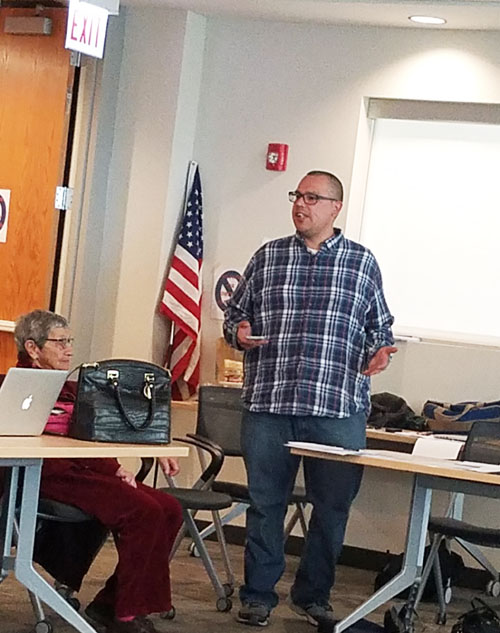Chicago Metro seniors April meeting of Chicago Metro Retirees worries about Climate Change and Trump policies...
 One of the speakers at the Metro Seniors April 2017 meeting. Substance photo by Jean Schwab.There is growing concern with issues of climate change and protection of our environment among the Illinois Alliance for Retired People who met in April. Alarm bells are going off daily with regulations against pollution and climate change that are being lifted by Scott Pruitt and Donald Trump. Two speakers highlighted problems with the government’s policies: Earchiel Johnson spoke about Chicago Workers and Standing Rock Pipeline activist. Deborah Orr, environment activist and EPA retiree, spoke regarding environmental protections.
One of the speakers at the Metro Seniors April 2017 meeting. Substance photo by Jean Schwab.There is growing concern with issues of climate change and protection of our environment among the Illinois Alliance for Retired People who met in April. Alarm bells are going off daily with regulations against pollution and climate change that are being lifted by Scott Pruitt and Donald Trump. Two speakers highlighted problems with the government’s policies: Earchiel Johnson spoke about Chicago Workers and Standing Rock Pipeline activist. Deborah Orr, environment activist and EPA retiree, spoke regarding environmental protections.
Earchiel Johnson along with David Bender, Native American activist, spoke about traveling to the Standing Rock reservation in South Dakota and making a video for people interested in becoming activist. Going to Standing Rock to demonstrate should not be seen as an adventure. As an activist in the video, Leo Baker, stated: “People are needed who respect our lands and ways, good, honorable people.” People who could demonstrate in a peaceful manner and work. There were volunteer jobs in the kitchen, working in the school with children or chopping wood.
According to Johnson, Standing Rock was only for people who wanted to work to protect our water and the rights of the tribe. At least 7,500 people were at Standing Rock, a large number considering that North Dakota cities have an average population of 2,000 people. Nearly 300 indigenous nations were involved in Standing Rock. Outspoken opposition to the Keystone Pipeline came from Phyllis Young, attorney and member of the Standing Rock Tribe, and Nebraska Democratic Party Chair, Jan Kleeb, who has earned the name “Pipeline Killer” by her opposition to the pipeline.
Johnson stated that while the protesters were nonviolent, they were met with rubber bullets and tear gas. Other outrageous actions were the possible polluting of the water source and rapid action to dig up a sacred burial site. The company moved rapidly because they were afraid that, if they waited, the land could be designated as a historical site and the company would not be allowed to dig.
When asked what is happening now with DAPL, Johnson stated that they were moving to other places and struggle to divest money from banks financing the Pipeline. The Chicago City Council Joint Committee on Finance;Health;and Environment Protection introduced On September 14, 2016, a resolution R2016-622 in the City Council, calling for the City to support the Standing Rock Sioux Indian Tribe, oppose the construction of the Dakota Access Pipeline (DAPL) ,and condemn Wells Fargo and other financial institutions’ investments in the building of this pipeline as contrary to the City of Chicago’s values. The resolution prohibits the Chief Financial Officer and Council from doing business with six banks who invested in the pipeline.
The resolution was signed by Carlos Ramairez -Rosa, Alderman, 35th Ward.
The next speaker was Orr, who quoted Mustafa Ali, an EPA retiree, “The EPA is rolling back regulations and proposals to disseminate EPA.” Orr is concerned that the great lakes EPA, region 5 (which covers 6 states, Ohio, Indiana, Illinois, Wisconsin, Michigan and Minnesota) and has specific knowledge of the Great Lakes will be closed and combined with the Kansas, St. Louis office. Orr stated, “We have all the oil we need without more dirty oil running through pipelines.” Using a Power Point presentation, Orr stated that: The changes will have significant impacts on public health and the environment of our country. Communities of color, low -income communities, indigenous populations still struggling to receive equal protections before the law. Low income and minority populations are more likely to experience negative impacts of pollution.”
Trump’s budget recommended closing the environmental justice office and transferring any work on vulnerable communities to the EPA’s more general Office of Policy.
What are the changes in regulations?
New policies will reject the ban of chlorphrifor, a chemical associated with brain damage in children and farm workers.
Executive Order (EO) seeks to dismantle much of the work on climate change enacted by the Obama administration. The Paris Climate Agreement was signed by 195 counties.
The Dakota Access Pipeline is prepared for use despite the treaty signed in1815 with the Standing Rock Sioux Reservation.
Phyllis Young, attorney and elder member of the tribe, said that “according to the treaty with the Sioux Nation in 1851 -- not 1815 -- the land that has the pipeline under it belongs to the Standing Rock Reservation.”
There is going to be a People’s Summit at McCormick, June 9-11, 2017.


By: Jean Schwab
Very Important
I am so glad to see this article in print. Every month the Retirees discuss so many very important topics and this is super important.